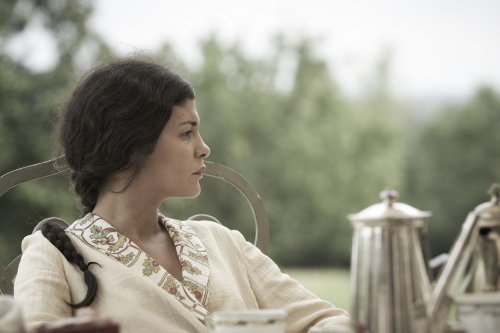Reviews - Therese
Therese
Reviewed By Vaughan Ames

Therese
Our fifteenth year of bringing films to Keswick started on Sunday night. 129 people came along to enjoy a glass of wine and a chat before sitting back to enjoy the film – Therese'.
It has become almost a tradition for the club to start the season with a period drama – preferably French - to get everyone in the mood. This year was no exception. 'Therese' is set in 1920s France, among the pine forests of the Landes area in Southwest France. Owned by two families – the Larroques and the Desqueyrouxs; we are firmly in the world of the landed gentry.
The film begins with a young teenage Therese playing with her best friend Ann, who tells her everyone expects Therese to marry Ann's brother Bernard one day to join these two families together. The tragedy of this is marked by the sight of Ann first shooting a pigeon and then ringing its neck; nothing good will come of the marriage.
We then step forward a few years and meet Therese walking with Bernard in one of the huge forests he owns swopping stories of how far their forests reach. Already Therese is bored, slowly smoking cigarettes, but looking forward to marrying Bernard; her 'strange ideas' that they might be marrying each other's pine trees rather than for love will surely be 'cured' then? “It is up to you to destroy these ideas” she says to the man she expects to run her life; Therese's radical ideas do not include feminism it seems!
The thorn in the side of Therese's hopes for an easy, comfortable, provincial life is shown through her friendship with Ann. Ann believes in romance, in love and in passion, and assumes Therese feels all these things for Bernard. Therese is more interested in reading a book; why should she worry about passion?
The beautiful country wedding is used to show the distance between Therese and Bernard. He cannot find her as she is busy dancing with a young girl; she watches Bernard searching for her and it is almost an afterthought that she bothers to call out to him. The wedding night is equally disappointing for her; we see her lying back and, presumably, thinking of France...
Whilst still on their honeymoon, news arrives that Ann has had the temerity to risk the arranged marriage set up for her by falling in love with Jean Azevedo. Bernard is horrified, especially as Jean might be Jewish. Therese receives her own letters detailing Ann's passion and love for Jean and asking for her support against the family. This is the turning point for Therese; will she support true love, or the family honour? As a born romantic, I certainly expected true love to win out, but I was forgetting that this was the landed gentry. After much delay, Therese follows the family line and encourages Jean to write a letter saying goodbye. This betrayal was only softened in the film by the fact that Jean did not appear to want to marry Ann anyway; was this true, as Therese claimed to believe, or a lie to save face as Bernard proposed? Either way, Ann never forgives Therese.
For me, this was also the turning point of the film; Therese's thoughts are everything to the story but the film failed to make them clear. It all got a bit messy for me, though most of the audience seemed to disagree with me so I might well have missed the point.
In what appears to be a side story, we see Bernard having heart pains. He eventually goes to a doctor who prescribes 4 drops of arsenic a day... we also see Therese's horror as several hares are killed ; could this be a sign?
The stultifying family life is driving Therese more and more into herself; she is seen as part of the family, but wanting much more intellectual stimulation. Even the birth of a baby girl seems to leave her indifferent. Finally a very hot summer brings the almost inevitable forest fires; Bernard starts to panic, while Therese floats over it all, just reading a book. Bernard's panic leads him to take too much arsenic by accident; Therese looks on but does nothing...could this be a way out? She begins to give him overdoses, making him very sick. Unfortunately for Therese, the doctors spot what is wrong and also realise she has been forging the doctor's name on his prescriptions.
Is it all over for Therese? Not to worry, family honour rides to her rescue. Although they shut her up in a bedroom, they cannot let the outside world know what she has done. The family vouch for her innocence – even Bernard testifies on her behalf. The case is dropped but Therese's punishment continues as the family will not let her walk away. She is left to live alone in her home, where she appears to live on wine and cigarettes. Therese loses weight, loses interest in living until Bernard, realising this could lead to an even bigger scandal, agrees to let her leave. He takes her to Paris, where they part on almost good terms; has he really forgiven her? Should we forgive her? It is up to us to decide as she walks off into the crowd...
'Therese' was the last film directed by Claude Miller who died shortly after it was completed. He was most famous for his work alongside Francois Truffaut, but also for the style of his own; he especially liked to have his central character under pressure, so this story suited him. It is taken from the 1927 novel 'Therese Desqueyroux' by Francois Mauriac which was judged one of the best 12 novels written in France in the first half of the 20th century. Has Miller done it proud?
It was certainly beautifully filmed; both the scenes inside the mansions and out in the forests could have been paintings by Vermeer. He also caught the mood of indifference both families had to the rest of the world. That said, for me at least, he left far too much unsaid; we could only guess at the reasons for Therese's actions. Yes, she might well have regretted marrying into such a family, but she didn't appear to notice that her own family were no better. Perhaps Miller is simply trying to show what all aristocracy are really like. I haven't read the book, but I might have to in order to find out what drove her.
We could also debate the acting. Therese was played by Audrey Tautou, best known for her impish portrayal of the title role in 'Amelie', where her very liveliness carried the film. Here, she is left with little to do but stare at the lens and look bored. She gets rave reviews everywhere for this so I wouldn't dare argue that she failed to show any of the inner turmoil she was supposed to be suffering. Overall the audience loved it so maybe I am simply being over-critical.
Next week we make a very different journey - to Argentina to watch 'White Elephant', a hard-hitting drama in the slums of Buenos Aires where the rich are the drug barons, the poor do not even have anywhere to live.
It has become almost a tradition for the club to start the season with a period drama – preferably French - to get everyone in the mood. This year was no exception. 'Therese' is set in 1920s France, among the pine forests of the Landes area in Southwest France. Owned by two families – the Larroques and the Desqueyrouxs; we are firmly in the world of the landed gentry.
The film begins with a young teenage Therese playing with her best friend Ann, who tells her everyone expects Therese to marry Ann's brother Bernard one day to join these two families together. The tragedy of this is marked by the sight of Ann first shooting a pigeon and then ringing its neck; nothing good will come of the marriage.
We then step forward a few years and meet Therese walking with Bernard in one of the huge forests he owns swopping stories of how far their forests reach. Already Therese is bored, slowly smoking cigarettes, but looking forward to marrying Bernard; her 'strange ideas' that they might be marrying each other's pine trees rather than for love will surely be 'cured' then? “It is up to you to destroy these ideas” she says to the man she expects to run her life; Therese's radical ideas do not include feminism it seems!
The thorn in the side of Therese's hopes for an easy, comfortable, provincial life is shown through her friendship with Ann. Ann believes in romance, in love and in passion, and assumes Therese feels all these things for Bernard. Therese is more interested in reading a book; why should she worry about passion?
The beautiful country wedding is used to show the distance between Therese and Bernard. He cannot find her as she is busy dancing with a young girl; she watches Bernard searching for her and it is almost an afterthought that she bothers to call out to him. The wedding night is equally disappointing for her; we see her lying back and, presumably, thinking of France...
Whilst still on their honeymoon, news arrives that Ann has had the temerity to risk the arranged marriage set up for her by falling in love with Jean Azevedo. Bernard is horrified, especially as Jean might be Jewish. Therese receives her own letters detailing Ann's passion and love for Jean and asking for her support against the family. This is the turning point for Therese; will she support true love, or the family honour? As a born romantic, I certainly expected true love to win out, but I was forgetting that this was the landed gentry. After much delay, Therese follows the family line and encourages Jean to write a letter saying goodbye. This betrayal was only softened in the film by the fact that Jean did not appear to want to marry Ann anyway; was this true, as Therese claimed to believe, or a lie to save face as Bernard proposed? Either way, Ann never forgives Therese.
For me, this was also the turning point of the film; Therese's thoughts are everything to the story but the film failed to make them clear. It all got a bit messy for me, though most of the audience seemed to disagree with me so I might well have missed the point.
In what appears to be a side story, we see Bernard having heart pains. He eventually goes to a doctor who prescribes 4 drops of arsenic a day... we also see Therese's horror as several hares are killed ; could this be a sign?
The stultifying family life is driving Therese more and more into herself; she is seen as part of the family, but wanting much more intellectual stimulation. Even the birth of a baby girl seems to leave her indifferent. Finally a very hot summer brings the almost inevitable forest fires; Bernard starts to panic, while Therese floats over it all, just reading a book. Bernard's panic leads him to take too much arsenic by accident; Therese looks on but does nothing...could this be a way out? She begins to give him overdoses, making him very sick. Unfortunately for Therese, the doctors spot what is wrong and also realise she has been forging the doctor's name on his prescriptions.
Is it all over for Therese? Not to worry, family honour rides to her rescue. Although they shut her up in a bedroom, they cannot let the outside world know what she has done. The family vouch for her innocence – even Bernard testifies on her behalf. The case is dropped but Therese's punishment continues as the family will not let her walk away. She is left to live alone in her home, where she appears to live on wine and cigarettes. Therese loses weight, loses interest in living until Bernard, realising this could lead to an even bigger scandal, agrees to let her leave. He takes her to Paris, where they part on almost good terms; has he really forgiven her? Should we forgive her? It is up to us to decide as she walks off into the crowd...
'Therese' was the last film directed by Claude Miller who died shortly after it was completed. He was most famous for his work alongside Francois Truffaut, but also for the style of his own; he especially liked to have his central character under pressure, so this story suited him. It is taken from the 1927 novel 'Therese Desqueyroux' by Francois Mauriac which was judged one of the best 12 novels written in France in the first half of the 20th century. Has Miller done it proud?
It was certainly beautifully filmed; both the scenes inside the mansions and out in the forests could have been paintings by Vermeer. He also caught the mood of indifference both families had to the rest of the world. That said, for me at least, he left far too much unsaid; we could only guess at the reasons for Therese's actions. Yes, she might well have regretted marrying into such a family, but she didn't appear to notice that her own family were no better. Perhaps Miller is simply trying to show what all aristocracy are really like. I haven't read the book, but I might have to in order to find out what drove her.
We could also debate the acting. Therese was played by Audrey Tautou, best known for her impish portrayal of the title role in 'Amelie', where her very liveliness carried the film. Here, she is left with little to do but stare at the lens and look bored. She gets rave reviews everywhere for this so I wouldn't dare argue that she failed to show any of the inner turmoil she was supposed to be suffering. Overall the audience loved it so maybe I am simply being over-critical.
Next week we make a very different journey - to Argentina to watch 'White Elephant', a hard-hitting drama in the slums of Buenos Aires where the rich are the drug barons, the poor do not even have anywhere to live.
Find A Film
Search over 1500 films in the Keswick Film Club archive.
Friends
KFC is friends with Caldbeck Area Film Society and Brampton Film Club and members share benefits across all organisations
Awards
Keswick Film Club won the Best New Film Society at the British Federation Of Film Societies awards in 2000.
Since then, the club has won Film Society Of The Year and awards for Best Programme four times and Best Website twice.
We have also received numerous Distinctions and Commendations in categories including marketing, programming and website.
 Talking Pictures
The KFC Newsletter
Talking Pictures
The KFC Newsletter
Links Explore the internet with Keswick Film Club


